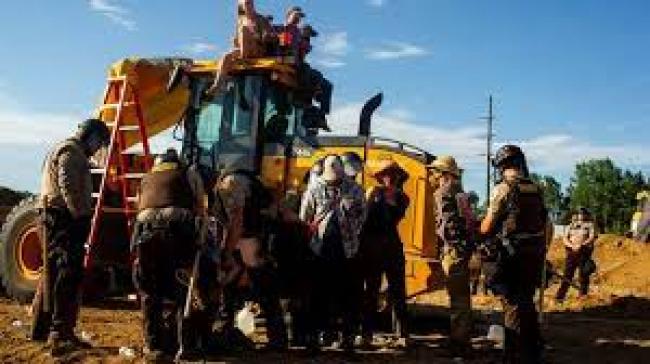Articles Menu

Aug. 9. 2021
A Canadian Oil company has given Minnesota law enforcement $2 million to fund the policing of protests against construction of its pipeline, Motherboard has learned.
Calgary-based oil giant Enbridge set up a fund called the Public Safety Escrow Trust in May, 2020 as part of its permitting process for the Line 3 pipeline route, which carries tar sands oil from Edmonton, Alberta to Superior, Wisconsin. The funds in this account have been used to reimburse costs associated with “maintaining the peace” around the pipeline, including for officer wages, lodging, and boom trucks, according to the Minnesota Public Utilities Commission (PUC) and Line 3 permits.
On July 29, a group of unarmed environmental activists protesting the pipeline in Thief River Falls, Minnesota were tear gassed, shot with rubber bullets, and arrested.
“It was a really brutal scene,” Tara Houska, an Ojibwe lawyer and activist who was arrested at the protest, told Motherboard. “The level of force being used, partnered with the very close range that law enforcement was facing us, led to some pretty serious injuries … It was really an extreme level of force, partnered with a really punitive and oppressive style of jailing.”
The nearby Marshall County Sheriff’s Department filed a reimbursement request for expenses associated with that day’s patrol, a spokesperson for the Minnesota PUC confirmed to Motherboard. According to the utility regulator, between June 8 and July 31, the Sheriff's Department was reimbursed $20,057.90 by Enbridge for personnel expenses associated with Line 3 assists. The Marshall County Sheriff’s Department did not respond to a request for comment.
Enbridge's proposed 340-mile pipeline is an expansion of Line 3, a 1960s-era line. The company began construction on the Minnesota stretch of the route in December, 2020. Part of the pipe runs through waterways, including the Red River and the Mississippi River, which are home to wild rice paddies tended to by local communities.
Enbridge justifies the pipeline expansion as necessary to uphold “high safety standards.” But community members living near it say the project exchanges environmental destruction and the sacrifice of land for a polluting energy source. The pipeline has also been tied to several instances of sex trafficking, harassment, and assault of local community members.
Environmental activists, many from Indigenous territories through which the pipeline would run, have opposed the project for the last seven years. Activists' efforts ramped up in November 2020 when the Minnesota Pollution Control Agency (MPCA) issued Enbridge water crossing permits. Grassroots collectives like Honor the Earth, Minnesota 350, and Stop Line 3 have garnered international support—including from the likes of Jane Fonda—for direct actions held to obstruct and halt pipeline construction in the months since. Many of these direct actions have been met with violence by local police.
Though the July 29 incident was not the first time activists have been met by resistance from law enforcement, it was the first time police had used less-than-lethal weapons, the Giniw Collective, an environmental activist group led by Indigenous women and two-spirit people organizing against the pipeline, wrote in a Facebook post on August 1. Twenty activists were arrested and taken to Pennington County jail, where several were denied food and medical care for their injuries and held in solitary confinement, the group claimed.
Among them was Giniw Collective founder Houska, who told Motherboard that after being attacked and zip tied, she was kept in solitary confinement for four days, denied food that aligned with her dietary needs, and ultimately hospitalized. Pennington County Jail administrator Dave Casanova directed Motherboard to the county sheriff for comment. The sheriff did not immediately respond to this request.
Houska shared images of bruises and rubber bullet wounds on her arms on Twitter and Facebook on Sunday, connecting the attack to a proven financial relationship between state law enforcement and Enbridge.
The existence of the Public Safety Escrow fund has been known for some time, thanks to activists and media reports. An April report from the Minnesota Reformer based on documents obtained through public records requests showed that Enbridge established a financial relationship with Minnesota law enforcement in May, 2020, as part of the permits that PUC issued, creating a "public safety" reimbursement fund for any pipeline-related police action and emergency responders.
In its permitting documentation, the PUC cited increased law enforcement expenses around pipelines in other parts of the country as reasoning for establishing the fund.The funds live in an escrow account managed by a state-appointed official, to whom agencies send requests for reimbursement of costs related to “coordination of public safety and emergency responders, public safety-related costs for maintaining the peace in and around the construction site, review and oversight of any private security services,” and other similar costs. The MPUC told Motherboard that the account “may not be used to reimburse expenses for equipment, except for personal protective gear for public safety personnel.”
[Top image: DEMONSTRATORS PROTEST LINE 3 PIPELINE. IMAGE: NICOLE NERI/BLOOMBERG VIA GETTY IMAGE]